- Home
- Brandon Sanderson
Words of Radiance Page 15
Words of Radiance Read online
Page 15
Aladar himself didn’t fight, but had instead set up a command center on an adjacent plateau. Dalinar pointed toward the flapping banner, and one of his large mechanical bridges rolled into place. Pulled by chulls and full of gears, levers, and cams, the bridges protected the men who worked them. They were also very slow. Dalinar waited with self-disciplined patience as the workers ratcheted the bridge down, spanning the chasm between this plateau and the one where Aladar’s banner flew.
Once the bridge was in position and locked, his bodyguard—led by one of Captain Kaladin’s darkeyed officers—trotted onto it, spears to shoulders. Dalinar had promised Kaladin his men would not have to fight except to defend him. Once they were across, Dalinar kicked Gallant into motion to cross to Aladar’s command plateau. Dalinar felt too light on the stallion’s back—the lack of Shardplate. In the many years since he’d obtained his suit, he’d never gone out onto a battlefield without it.
Today, however, he didn’t ride to battle—not truly. Behind him, Adolin’s own personal banner flew, and he led the bulk of Dalinar’s armies to assault the plateau where Aladar’s men already fought. Dalinar didn’t send any orders regarding how the assault should go. His son had been trained well, and he was ready to take battlefield command—with General Khal at his side, of course, for advice.
Yes, from now on, Adolin would lead the battles.
Dalinar would change the world.
He rode toward Aladar’s command tent. This was the first plateau run following his proclamation requiring the armies to work together. The fact that Aladar had come as commanded, and Roion had not—even though the target plateau was closest to Roion’s warcamp—was a victory unto itself. A small encouragement, but Dalinar would take what he could get.
He found Highprince Aladar watching from a small pavilion set up on a secure, raised part of this plateau overlooking the battlefield. A perfect location for a command post. Aladar was a Shardbearer, though he commonly lent his Plate and Blade to one of his officers during battles, preferring to lead tactically from behind the battle lines. A practiced Shardbearer could mentally command a Blade to not dissolve when he let go of it, though—in an emergency—Aladar could summon it to himself, making it vanish from the hands of his officer in an eyeblink, then appear in his own hands ten heartbeats later. Lending a Blade required a great deal of trust on both sides.
Dalinar dismounted. His horse, Gallant, glared at the groom who tried to take him, and Dalinar patted the horse on the neck. “He’ll be fine on his own, son,” he said to the groom. Most common grooms didn’t know what to do with one of the Ryshadium anyway.
Trailed by his bridgeman guards, Dalinar joined Aladar, who stood at the edge of the plateau, overseeing the battlefield ahead and just below. Slender and completely bald, the man had skin a darker tan than most Alethi. He stood with hands behind his back, and wore a sharp traditional uniform with a skirtlike takama, though he wore a modern jacket above it, cut to match the takama.
It was a style Dalinar had never seen before. Aladar also wore a thin mustache and a tuft of hair beneath his lip, again an unconventional choice. Aladar was powerful enough, and renowned enough, to make his own fashion—and he did so, often setting trends.
“Dalinar,” Aladar said, nodding to him. “I thought you weren’t going to fight on plateau runs any longer.”
“I’m not,” Dalinar said, nodding toward Adolin’s banner. There, soldiers streamed across Dalinar’s bridges to join the battle. The plateau was small enough that many of Aladar’s men had to withdraw to make way, something they were obviously all too eager to do.
“You almost lost this day,” Dalinar noted. “It is well that you had support.” Below, Dalinar’s troops restored order to the battlefield and pushed against the Parshendi.
“Perhaps,” Aladar said. “Yet in the past, I was victorious in one out of three assaults. Having support will mean I win a few more, certainly, but will also cost half my earnings. Assuming the king even assigns me any. I’m not convinced that I’ll be better off in the long run.”
“But this way, you lose fewer men,” Dalinar said. “And the total winnings for the entire army will rise. The honor of the—”
“Don’t talk to me about honor, Dalinar. I can’t pay my soldiers with honor, and I can’t use it to keep the other highprinces from snapping at my neck. Your plan favors the weakest among us and undercuts the successful.”
“Fine,” Dalinar snapped, “honor has no value to you. You will still obey, Aladar, because your king demands it. That is the only reason you need. You will do as told.”
“Or?” Aladar said.
“Ask Yenev.”
Aladar started as if slapped. Ten years back, Highprince Yenev had refused to accept the unification of Alethkar. At Gavilar’s order, Sadeas had dueled the man. And killed him.
“Threats?” Aladar asked.
“Yes.” Dalinar turned to look the shorter man in the eyes. “I’m done cajoling, Aladar. I’m done asking. When you disobey Elhokar, you mock my brother and what he stood for. I will have a unified kingdom.”
“Amusing,” Aladar said. “Good of you to mention Gavilar, as he didn’t bring the kingdom together with honor. He did it with knives in the back and soldiers on the field, cutting the heads off any who resisted. Are we back to that again, then? Such things don’t sound much like the fine words of your precious book.”
Dalinar ground his teeth, turning away to watch the battlefield. His first instinct was to tell Aladar he was an officer under Dalinar’s command, and take the man to task for his tone. Treat him like a recruit in need of correction.
But what if Aladar just ignored him? Would he force the man to obey? Dalinar didn’t have the troops for it.
He found himself annoyed—more at himself than at Aladar. He’d come on this plateau run not to fight, but to talk. To persuade. Navani was right. Dalinar needed more than brusque words and military commands to save this kingdom. He needed loyalty, not fear.
But storms take him, how? What persuading he’d done in life, he’d accomplished with a sword in hand and a fist to the face. Gavilar had always been the one with the right words, the one who could make people listen.
Dalinar had no business trying to be a politician.
Half the lads on that battlefield probably didn’t think they had any business being soldiers, at first, a part of him whispered. You don’t have the luxury of being bad at this. Don’t complain. Change.
“The Parshendi are pushing too hard,” Aladar said to his generals. “They want to shove us off the plateau. Tell the men to give a little and let the Parshendi lose their advantage of footing; that will let us surround them.”
The generals nodded, one calling out orders.
Dalinar narrowed his eyes at the battlefield, reading it. “No,” he said softly.
The general stopped giving orders. Aladar glanced at Dalinar.
“The Parshendi are preparing to pull back,” Dalinar said.
“They certainly don’t act like it.”
“They want some room to breathe,” Dalinar said, reading the swirl of combat below. “They nearly have the gemheart harvested. They will continue to push hard, but will break into a quick retreat around the chrysalis to buy time for the final harvesting. That’s what you’ll need to stop.”
The Parshendi surged forward.
“I took point on this run,” Aladar said. “By your own rules, I get final say over our tactics.”
“I observe only,” Dalinar said. “I’m not even commanding my own army today. You may choose your tactics, and I will not interfere.”
Aladar considered, then cursed softly. “Assume Dalinar is correct. Prepare the men for a withdrawal by the Parshendi. Send a strike team forward to secure the chrysalis, which should be almost opened up.”
The generals set up the new details, and messengers raced off with the tactical orders. Aladar and Dalinar watched, side by side, as the Parshendi shoved forward. That singing of theirs hovered
over the battlefield.
Then they pulled back, careful as always to respectfully step over the bodies of the dead. Ready for this, the human troops rushed after. Led by Adolin in gleaming Plate, a strike force of fresh troops broke through the Parshendi line and reached the chrysalis. Other human troops poured through the gap they opened, shoving the Parshendi to the flanks, turning the Parshendi withdrawal into a tactical disaster.
In minutes, the Parshendi had abandoned the plateau, jumping away and fleeing.
“Damnation,” Aladar said softly. “I hate that you’re so good at this.”
Dalinar narrowed his eyes, noticing that some of the fleeing Parshendi stopped on a plateau a short distance from the battlefield. They lingered there, though much of their force continued on away.
Dalinar waved for one of Aladar’s servants to hand him a spyglass, then he raised it, focusing on that group. A figure stood at the edge of the plateau out there, a figure in glistening armor.
The Parshendi Shardbearer, he thought. The one from the battle at the Tower. He almost killed me.
Dalinar didn’t remember much from that encounter. He’d been beaten near senseless toward the end of it. This Shardbearer hadn’t participated in today’s battle. Why? Surely with a Shardbearer, they could have opened the chrysalis sooner.
Dalinar felt a disturbing pit inside of him. This one fact, the watching Shardbearer, changed his understanding of the battle entirely. He thought he’d been able to read what was going on. Now it occurred to him that the enemy’s tactics were more opaque than he’d assumed.
“Are some of them still out there?” Aladar asked. “Watching?”
Dalinar nodded, lowering his spyglass.
“Have they done that before in any battle you’ve fought?”
Dalinar shook his head.
Aladar mulled for a moment, then gave orders for his men on the plateau to remain alert, with scouts posted to watch for a surprise return of the Parshendi.
“Thank you,” Aladar added, grudgingly, turning to Dalinar. “Your advice proved helpful.”
“You trusted me when it came to tactics,” Dalinar said, turning to him. “Why not try trusting me in what is best for this kingdom?”
Aladar studied him. Behind, soldiers cheered their victory and Adolin ripped the gemheart free from the chrysalis. Others fanned out to watch for a return attack, but none came.
“I wish I could, Dalinar,” Aladar finally said. “But this isn’t about you. It’s about the other highprinces. Maybe I could trust you, but I’ll never trust them. You’re asking me to risk too much of myself. The others would do to me what Sadeas did to you on the Tower.”
“What if I can bring the others around? What if I can prove to you that they’re worthy of trust? What if I can change the direction of this kingdom, and this war? Will you follow me then?”
“No,” Aladar said. “I’m sorry.” He turned away, calling for his horse.
The trip back was miserable. They’d won the day, but Aladar kept his distance. How could Dalinar do so many things so right, yet still be unable to persuade men like Aladar? And what did it mean that the Parshendi were changing tactics on the battlefield, not committing their Shardbearer? Were they too afraid to lose their Shards?
When, at long last, Dalinar returned to his bunker in the warcamps—after seeing to his men and sending a report to the king—he found an unexpected letter waiting for him.
He sent for Navani to read him the words. Dalinar stood waiting in his private study, staring at the wall that had borne the strange glyphs. Those had been sanded away, the scratches hidden, but the pale patch of stone whispered.
Sixty-two days.
Sixty-two days to come up with an answer. Well, sixty now. Not much time to save a kingdom, to prepare for the worst. The ardents would condemn the prophecy as a prank at best, or blasphemous at worst. To foretell the future was forbidden. It was of the Voidbringers. Even games of chance were suspect, for they incited men to look for the secrets of what was to come.
He believed anyway. For he suspected his own hand had written those words.
Navani arrived and looked over the letter, then started reading aloud. It turned out to be from an old friend who was going to arrive soon on the Shattered Plains—and who might provide a solution to Dalinar’s problems.
I wish to think that had I not been under sorrow’s thumb, I would have seen earlier the approaching dangers. Yet in all honesty, I’m not certain anything could have been done.
—From the journal of Navani Kholin, Jesesach 1174
Kaladin led the way down into the chasms, as was his right.
They used a rope ladder, as they had in Sadeas’s army. Those ladders had been unsavory things, the ropes frayed and stained with moss, the planks battered by far too many highstorms. Kaladin had never lost a man because of those storming ladders, but he’d always worried.
This one was brand new. He knew that for a fact, as Rind the quartermaster had scratched his head at the request, and then had one built to Kaladin’s specifications. It was sturdy and well made, like Dalinar’s army itself.
Kaladin reached the bottom with a final hop. Syl floated down and landed on his shoulder as he held up a sphere to survey the chasm bottom. The single sapphire broam was worth more by itself than the entirety of his wages as a bridgeman.
In Sadeas’s army, the chasms had been a frequent destination for bridgemen. Kaladin still didn’t know if the purpose had been to scavenge every possible resource from the Shattered Plains, or if it had really been about finding something menial—and will-breaking—for bridgemen to do between runs.
The chasm bottom here, however, was untouched. There were no paths cut through the snarl of stormleavings on the ground, and there were no scratched messages or instructions in the lichen on the walls. Like the other chasms, this one opened up like a vase, wider at the bottom than at the cracked top—a result of waters rushing through during highstorms. The floor was relatively flat, smoothed by the hardened sediment of settling crem.
As he moved forward, Kaladin had to pick his way over all kinds of debris. Broken sticks and logs from trees blown in from across the Plains. Cracked rockbud shells. Countless tangles of dried vines, twisted through one another like discarded yarn.
And bodies, of course.
A lot of corpses ended up in the chasms. Whenever men lost their battle to seize a plateau, they had to retreat and leave their dead behind. Storms! Sadeas often left the corpses behind even if he won—and bridgemen he’d leave wounded, abandoned, even if they could have been saved.
After a highstorm, the dead ended up here, in the chasms. And since storms blew westward, toward the warcamps, the bodies washed in this direction. Kaladin found it hard to move without stepping on bones entwined in the accumulated foliage on the chasm floor.
He picked his way through as respectfully as he could as Rock reached the bottom behind him, uttering a quiet phrase in his native tongue. Kaladin couldn’t tell if it was a curse or a prayer. Syl moved from Kaladin’s shoulder, zipping into the air, then streaking in an arc to the ground. There, she formed into what he thought of as her true shape, that of a young woman with a simple dress that frayed to mist just below the knees. She perched on a branch and stared at a femur poking up through the moss.
She didn’t like violence. He wasn’t certain if, even now, she understood death. She spoke of it like a child trying to grasp something beyond her.
“What a mess,” Teft said as he reached the bottom. “Bah! This place hasn’t seen any kind of care at all.”
“It is a grave,” Rock said. “We walk in a grave.”
“All of the chasms are graves,” Teft said, his voice echoing in the dank confines. “This one’s just a messy grave.”
“Hard to find death that isn’t messy, Teft,” Kaladin said.
Teft grunted, then started to greet the new recruits as they reached the bottom. Moash and Skar were watching over Dalinar and his sons as they attended som
e lighteyed feast—something that Kaladin was glad to be able to avoid. Instead, he’d come with Teft down here.
They were joined by the forty bridgemen—two from each reorganized crew—that Teft was training with the hope that they’d make good sergeants for their own crews.
“Take a good look, lads,” Teft said to them. “This is where we come from. This is why some call us the order of bone. We’re not going to make you go through everything we did, and be glad! We could have been swept away by a highstorm at any moment. Now, with Dalinar Kholin’s stormwardens to guide us, we won’t have nearly as much risk—and we’ll be staying close to the exit just in case . . .”
Kaladin folded his arms, watching Teft instruct as Rock handed practice spears to the men. Teft himself carried no spear, and though he was shorter than the bridgemen who gathered around him—wearing simple soldiers’ uniforms—they seemed thoroughly intimidated.
What else did you expect? Kaladin thought. They’re bridgemen. A stiff breeze could quell them.
Still, Teft looked completely in control. Comfortably so. This was right. Something about it was just . . . right.
A swarm of small glowing orbs materialized around Kaladin’s head, spren the shape of golden spheres that darted this way and that. He started, looking at them. Gloryspren. Storms. He felt as if he hadn’t seen the like in years.
Syl zipped up into the air and joined them, giggling and spinning around Kaladin’s head. “Feeling proud of yourself?”
“Teft,” Kaladin said. “He’s a leader.”
“Of course he is. You gave him a rank, didn’t you?”
“No,” Kaladin said. “I didn’t give it to him. He claimed it. Come on. Let’s walk.”
She nodded, alighting in the air and settling down, her legs crossed at the knees as if she were primly seating herself in an invisible chair. She continued to hover there, moving exactly in step with him.
“Giving up all pretense of obeying natural laws again, I see,” he said.

 Steelheart
Steelheart The Rithmatist
The Rithmatist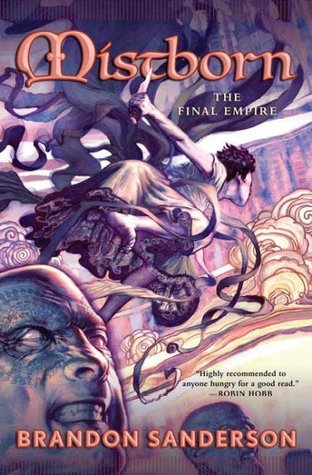 Mistborn: The Final Empire
Mistborn: The Final Empire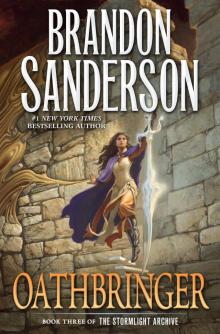 Oathbringer
Oathbringer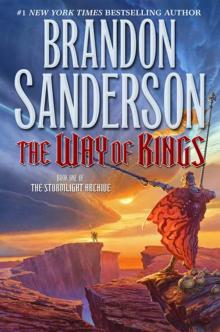 The Way of Kings
The Way of Kings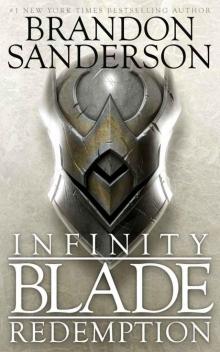 Redemption
Redemption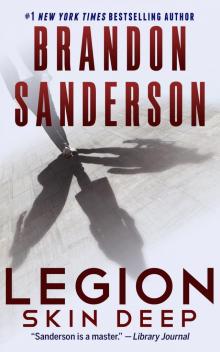 Skin Deep
Skin Deep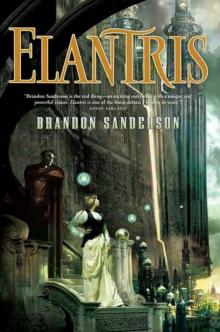 Elantris
Elantris Snapshot
Snapshot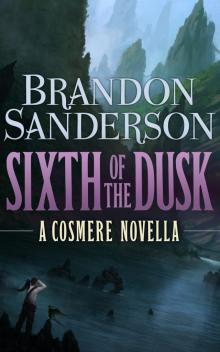 Sixth of the Dusk (Cosmere)
Sixth of the Dusk (Cosmere)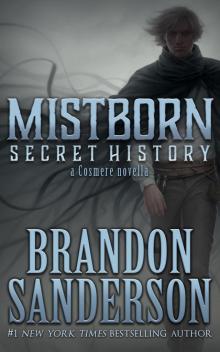 Mistborn: Secret History
Mistborn: Secret History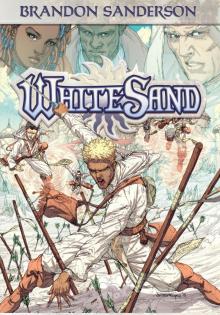 White Sand, Volume 1
White Sand, Volume 1 Legion
Legion The Well of Ascension
The Well of Ascension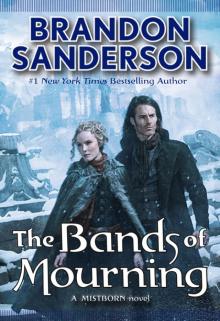 The Bands of Mourning
The Bands of Mourning Words of Radiance
Words of Radiance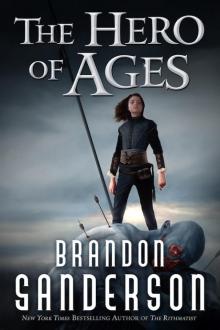 The Hero of Ages
The Hero of Ages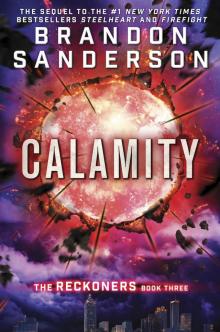 Calamity
Calamity Alcatraz Versus the Scrivener's Bones
Alcatraz Versus the Scrivener's Bones The Alloy of Law
The Alloy of Law The Emperors Soul
The Emperors Soul The Dark Talent
The Dark Talent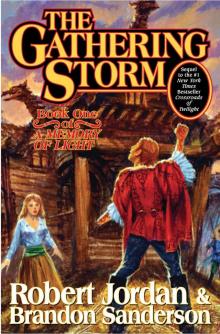 The Gathering Storm
The Gathering Storm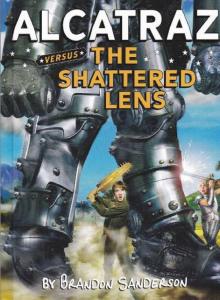 Alcatraz Versus the Shattered Lens
Alcatraz Versus the Shattered Lens Mitosis
Mitosis Alcatraz vs. The Evil Librarians
Alcatraz vs. The Evil Librarians Rhythm of War (9781429952040)
Rhythm of War (9781429952040)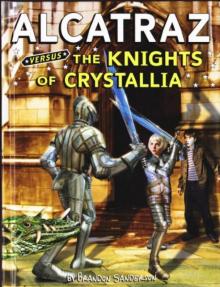 Alcatraz Versus the Knights of Crystallia
Alcatraz Versus the Knights of Crystallia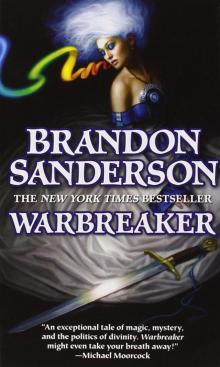 Warbreaker
Warbreaker Firstborn
Firstborn Starsight
Starsight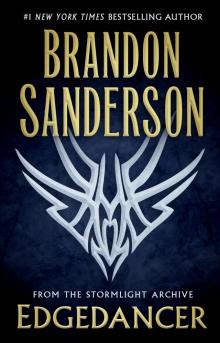 Edgedancer
Edgedancer Perfect State
Perfect State Shadows of Self
Shadows of Self The Way of Kings Prime
The Way of Kings Prime Starsight (US)
Starsight (US) Shadows for Silence in the Forests of Hell
Shadows for Silence in the Forests of Hell Arcanum Unbounded: The Cosmere Collection
Arcanum Unbounded: The Cosmere Collection Awakening
Awakening Firefight
Firefight Dawnshard
Dawnshard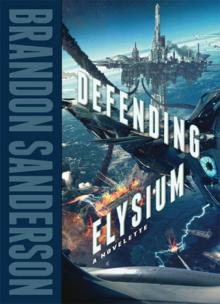 Defending Elysium
Defending Elysium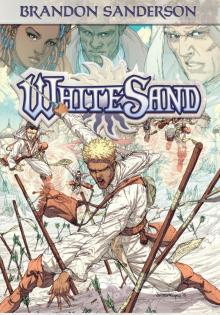 White Sand
White Sand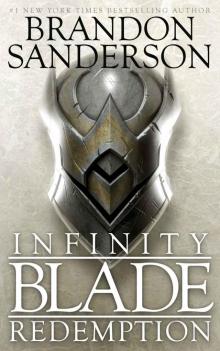 Infinity Blade: Redemption
Infinity Blade: Redemption The Final Empire
The Final Empire Skyward
Skyward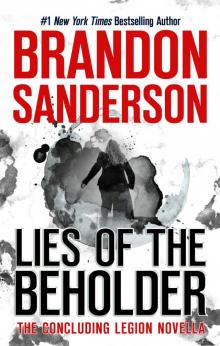 Lies of the Beholder
Lies of the Beholder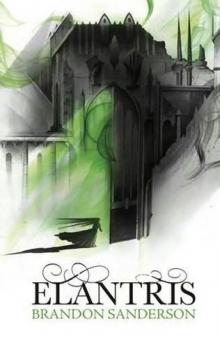 Elantris e-1
Elantris e-1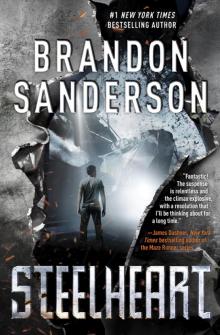 Steelheart r-1
Steelheart r-1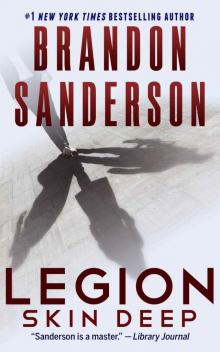 Legion: Skin Deep
Legion: Skin Deep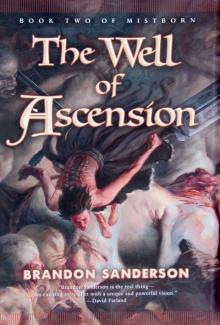 Well of Ascension
Well of Ascension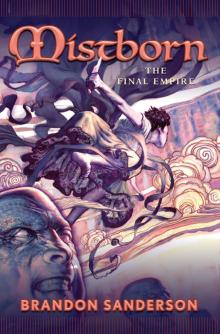 Mistborn
Mistborn Alcatraz versus the Evil Librarians
Alcatraz versus the Evil Librarians The Final Empire m-1
The Final Empire m-1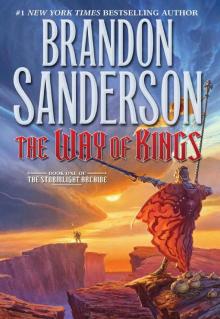 The Way of Kings (Stormlight Archive, The)
The Way of Kings (Stormlight Archive, The)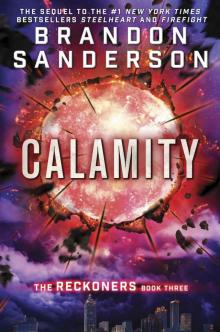 Calamity (The Reckoners)
Calamity (The Reckoners) Legion and the Emperor's Soul
Legion and the Emperor's Soul Legion: The Many Lives of Stephen Leeds
Legion: The Many Lives of Stephen Leeds The Mistborn Trilogy
The Mistborn Trilogy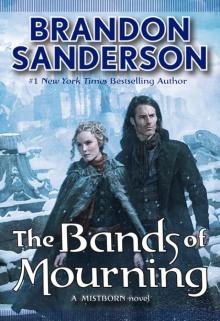 Bands of Mourning
Bands of Mourning Alcatraz
Alcatraz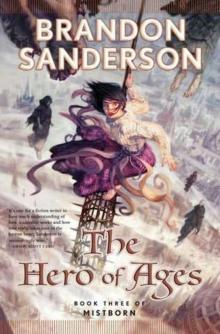 The Hero of Ages m-3
The Hero of Ages m-3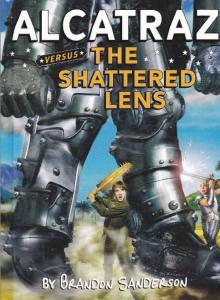 Alcatraz vs. the Shattered Lens
Alcatraz vs. the Shattered Lens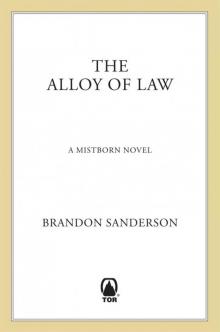 The Alloy of Law: A Mistborn Novel
The Alloy of Law: A Mistborn Novel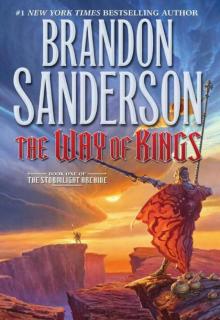 The Way of Kings sa-1
The Way of Kings sa-1 Infinity Blade: Awakening
Infinity Blade: Awakening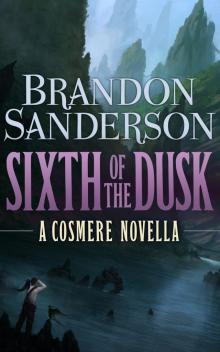 Sixth of the Dusk
Sixth of the Dusk The Stormlight Archive
The Stormlight Archive The Aether of Night
The Aether of Night